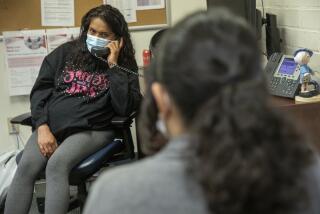Offering a Cure for Medicare Confusion
Ramona Ortega walked up to a row of bright booths at Olvera Street on Sunday, looking for some answers about Medicare. How could she avoid paying $100 for prescription drugs her doctor told her are essential for her health?
“My cardiologist said I had to take them, but I can’t pay,” Ortega said. “I was only able to pay one time.”
For the record:
12:00 a.m. Feb. 4, 2006 For The Record
Los Angeles Times Saturday February 04, 2006 Home Edition Main News Part A Page 2 1 inches; 43 words Type of Material: Correction
Drug plan -- An article in Monday’s California section said Medicare Part D beneficiaries must have Internet access to sign up for a prescription drug plan. In fact, beneficiaries can sign up for a plan via the telephone or by mail as well.
As both a Medicare and Medi-Cal beneficiary, the 77-year-old naturalized U.S. citizen from Guatemala is one of millions of seniors and low-income residents who have been left confused, frustrated and sometimes without their prescription drugs under the new Medicare plan that went into effect Jan. 1.
Before this month, Ortega didn’t have to make co-payments for her medicines.
She was among several seniors trying to figure out their options at the information booths set up by My Medicare Matters, an outreach effort of governmental agencies, church groups and organizations for the elderly put together since the new plan’s sign-up period began in November.
Surrounded by the bustling activity of the Olvera Street plaza, representatives of the Los Angeles Department of Aging and the National Council on Aging were on hand for much of the day. They answered questions and guided people through the process of choosing one of dozens of plans that would help Medicare recipients pay the lowest co-payments possible for their medications.
Under the new federal rules, Medicare recipients were automatically enrolled in a prescription drug plan called Part D. But when the plan went into effect, many couldn’t afford the $1 to $5 co-payments, which can add up for low-income seniors with multiple prescriptions.
“Previously they haven’t paid co-payments,” said Erin Westphal, information and assistance coordinator for the city Department of Aging. “Unfortunately there’s not a lot they can do. The pharmacies can choose to waive the co-payment, but not every time and not every month.”
Medicare and Medi-Cal recipients have until May to select a plan, a process My Medicare Matters is helping to facilitate at senior and community centers across the country. Once the sign-up period ends, beneficiaries may face fines for not choosing a prescription plan.
Confounding the sign-up process is the need for Internet access, which many seniors do not have, Westphal said. My Medicare Matters had computers with wireless Internet access set up for seniors to sign up for a plan on the spot.
The outreach program is sponsored by the Access to Benefits Coalition and is funded by a grant from AstraZeneca Pharmaceuticals. Officials with My Medicare Matters said seniors visiting booths were being given unbiased information on plans that would work best for them.
“It’s complicated. People have been bombarded with information, and there’s lots of opinion with that information,” Westphal said.
On Sunday, some seniors who sat with counselors were unable to complete the process and enroll in a new plan because they did not have their benefits information or a list of their prescriptions with them.
Language was also a barrier. Most of the seniors at the plaza were Spanish-speaking but were asked to fill out forms in English because the booths had run out of Spanish-language forms by 1 p.m.
Ana Hernandez, 79, said she was still unsure why the new system wasn’t working for her. She hadn’t figured out how she was going to pay new co-payments or which plan she would choose.
“Logically, I’m looking for the cheapest plan,” Hernandez said. “The truth is that we’re very confused.”
Ortega, like others, left without enrolling in a new Part D plan. She wasn’t carrying her benefits information or a list of her prescriptions. Ortega was given a telephone number to call when she had all her information in front of her.
More to Read
Sign up for Essential California
The most important California stories and recommendations in your inbox every morning.
You may occasionally receive promotional content from the Los Angeles Times.










